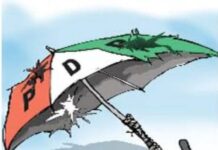Mahmud Jega
Chinua Achebe wrote that proverbs are the palm oil with which words are eaten. If he had updated Things Fall Apart before his passing, he probably would have added that double speak is the palm oil with which political words are eaten, while betrayal is the palm oil in which political loyalty is cooked. Former President Goodluck Jonathan discovered these truths last week at a ceremony in Benin to mark the 70th birthday of his former Chief of Staff, Mike Oghiadomhe.
Speaking at the event, the former [and possibly future] President accused some unnamed politicians of betraying him during the 2015 elections. He said, “Politics in the Nigerian standard is about betrayals. I witnessed a lot of betrayal during 2015 election. You will find it difficult to see somebody who will say the same thing in the morning and say the same thing in the afternoon and in the evening. Most politicians, you cannot take their words to the bank. They will tell you something this minute, and in the next hour, they will say another. For the next hour, they will say another thing.” He however exempted Oghiadomhe from the general charge, saying, “He is a reliable and trustworthy person who can take a bullet on my behalf. He is somebody you can take his words to the bank.”
Oga Goodluck, you have been in politics for nearly three decades in this Nigeria. Yours was truly a case of good luck because few people since 1999 have held as many juicy and sensitive political offices as you did. You were the Deputy Governor of oil-washed Bayelsa State for six years, then Governor of Bayelsa State for 18 months, then Vice President of the Federal Republic for three years. Afterwards, you were President of the Federal Republic for five full years, and since then you have been a statesman much sought after by regional and global agencies, because you refused Godsday Orubebe’s advice to scuttle an election midway.
Oga, you said you cannot take most Nigerian politicians’ words to the bank. Sorry sir, did anyone ever say that a politician’s word is a bankable proposal? Even if you take it to the bank, mean as Nigerian bank managers are, they will ask for collateral. What is the collateral for a politician’s promise? The fact that he won election before is not adequate collateral. I hear some people today saying someone has never lost an election; can that satisfy a bank manager? Will his Risk Assessment team accept that as collateral?
Oga Jonathan said he suffered a lot of betrayal in his unsuccessful reelection effort in 2015. Sir, it is because you are great. If we define betrayal in politics to mean to be deserted by close associates, which great politician in Nigeria since the First Republic has not suffered desertions by close associates? The greater you are as a politician, the more the deserters.
Many of Chief Obafemi Awolowo’s top aides in the First Republic, such as Chief Samuel Ladoke Akintola, deserted him at some point. In the Second Republic too, Mr. S. G. Ikoku, Alhaji Busari Adelakun, Chief Sunday Afolabi and Chief Akin Omoboriowo all deserted Awo, for different reasons. Not to mention Chief Joseph Tarka, AG’s top First Republic ally who crossed over to NPN in the Second Republic. A top Benue guy I once interviewed in Makurdi said in 1974, when Godwin Daboh Adzuana filed an affidavit in court alleging corruption against him, and Tarka had to resign as Federal Commissioner for Communications in the Gowon regime, he suspected Awo’s hand in it. I don’t know if that was true.
Sardauna was deserted in the 1950s by NPC’s secretary general Ibrahim Imam, who became leader of Borno Youth Movement, allied with AG and UMBC, and Tarka later sponsored this Borno man to return to Northern House of Assembly with a Tivland seat. Some First Republic NCNC folks deserted Dr. Nnamdi Azikiwe in the Second Republic, and Alhaji Waziri Ibrahim bolted from Nigeria Peoples Party [NPP] in 1978 to form Great Nigeria Peoples Party [GNPP] when Zik entered the party and his men demanded that either the chairmanship or the presidential ticket be ceded to him.
Uncle Waziri himself did not escape from desertions. GNPP’s two Second Republic governors, Muhammadu Goni of Borno and Abubakar Barde of Gongola, defected to UPN and NPP respectively. Malam Aminu Kano too suffered from loyalists’ desertions. PRP’s two governors, Mohamed Abubakar Rimi of Kano and Balarabe Musa of Kaduna, revolted and formed the PRP Tabo faction, which allied with UPN and NPP. Even PRP’s Secretary General, Ikoku, later crossed over to NPN and became Special Adviser to President Shehu Shagari. So, Oga Goodluck, you are in very good company in the matter of desertions and betrayal. In this Fourth Republic, who can count the number of politicians from ANPP and Alliance for Democracy [AD] that migrated to PDP as soon as it won the presidential election in 1999?
Betrayal may be common place in Nigerian politics, but it is not the only thing. Luck is also there, and Oga Goodluck’s career is the best testimony of the role luck plays in politics. I do not know how or why the late Diepreye Alamieyeseigha picked Jonathan as his running mate in 1999; his placid mien and his harmless looks must have helped. No doubt, luck was a decisive factor in his becoming Governor of Bayelsa in December 2005 when Alams was impeached, at the behest of then President Obasanjo. In 2007, luck again smiled when Oga Goodluck was picked as PDP candidate Umaru Yar’adua’s running mate, most probably as part of a scheme to appease Niger Deltans after stopping Dr. Peter Odili from snatching the top ticket.
And then, after being vice president for three years, he was catapulted to the top job following President Yar’adua’s death. Despite stiff opposition, he won his own term in 2011. Just because he didn’t get another full term in 2015, should Oga Goodluck now blame betrayal, rather than bad luck, for what happened? Good luck smiled at him most of the time, but on the one occasion when bad luck glared at him, he is alleging betrayal. Thousands of politicians in Nigeria are praying for good luck to smile at them at least for a while.
Besides, there are many reasons why politicians desert a leader. Ill treatment is one of them. Oga Goodluck is a jovial, happy go lucky fellow but you can never rule out the possibility that some of his associates and advisers meted out shabby treatment to some party folks. A second reason for desertion is failure to fulfil personal aspiration. It is a problem that has no solution, since there are only so many juicy political positions and too many people struggling to get them. A politician who fails to secure a ticket or a ministerial position will migrate to another party if he thinks he has better chances there, since all our parties have no program to speak of.
Another reason why associates desert a political leader is when they feel that he is on course to lose the election. Disorganised and unintelligent though many Nigerian politicians look, they have a very good sense of what voters in their localities are thinking. If voters in their locality dislike a leader, the local politician may pretend to back him but will secretly turn against him, at least for personal protection for himself and his family. The leader may only discover their disloyalty at the last minute.
A few politicians, however, choose to soldier on even when the odds are daunting. For example, I was in Bauchi in 2011 at the invitation of Governor Isa Yuguda to witness his campaign for reelection. He completely tied his campaign to Oga Jonathan’s. At several PDP rallies he held around the state, when the party chairman shouted, “Bauchi!” the crowd roared back, “Sai Malam [i.e. Yuguda].” But when the party chairman shouted, “Nigeria!” they always roared back, “Sai Buhari!” And those were PDP supporters! As we drove back to Bauchi late at night, I got close to Yuguda and advised him to decouple his campaign from the President’s because the risk was very obvious. He flatly refused, and told me that he did not believe in disloyalty. Buhari got 80% of the Bauchi vote that year, and a terrible post-election riot ensued when he lost the election. Yuguda only just managed to get reelected two weeks later; he later complained to me that President Jonathan did not so much as phone to wish him well once he secured his own reelection.
Maybe Oga Goodluck should also reflect on the rapid turnover of PDP national chairmen during his five years at the helm. Soon as he got the top job in 2010, he shoved out Vincent Ogbulafor for saying the North should get PDP’s 2011 ticket. Okwesilieze Nwodo took over but didn’t last long. Dr. Bello Haliru Mohammed acted for some months but was shoved aside to a ministerial job, while Kawu Baraje also acted briefly. Oga Jonathan then installed Bamanga Tukur, shoved him aside after two years and brought in Ahmadu Adamu Mu’azu, who he touted as the “game changer.” When the election was lost, Mua’zu too was vilified and shoved aside.
Lastly, since Dr. Goodluck Jonathan is being widely touted as a possible presidential contender next year, is it not advisable to avoid making controversial remarks, such as this one about betrayal? Some people who are gearing up to work for him again may now be afraid that maybe, they are in his [unrevealed] list of betrayers.
ThisDay





























































